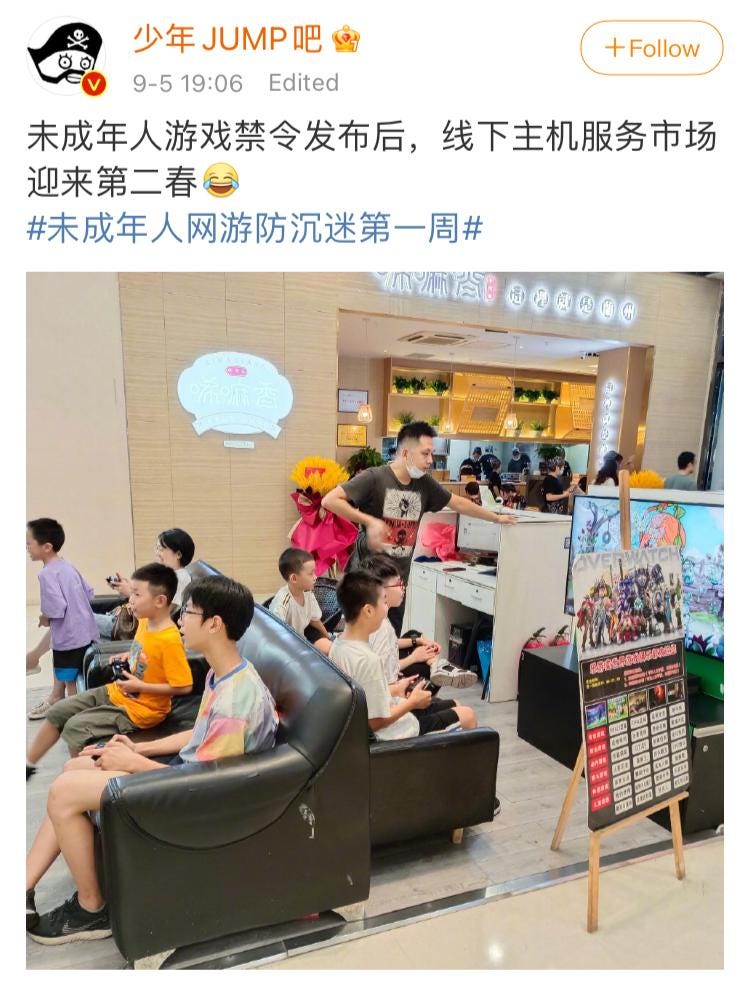China's Gaming Ban - Well Intentioned, But Misguided
By levelling the playing fields for tech firms, we can reclaim a society with a healthier and more measured relationship with our digital devices.
Perhaps even China’s government did not foresee this happening after their latest video games ban for youths:
The above was taken after the gaming ban was applied to youths below the age of 18 in China on August 30th 2021. Unsurprisingly, China’s youths are finding different ways to “game” the system and continue to engage in video games available in the non-mobile/offline formats.
Despite the apparent failures, I think there is merit in trying to rein in the negative effects of the gaming industry on the young. As a person who grew up in the digital age, it is hard to not look around and see that most of the top grossing applications today are targeted at short term engagement and hoarding our attention. This stated goal of consumer application development has led to today’s age being dubbed the Attention Economy. Today, Gacha games like Genshin Impact employ slot machine mechanics, while World of Warcraft and Honor of Kings use loot boxes and raffles to trick their free to play gamers into spending increasing amounts of money and time. On the other hand, consumer apps like Facebook, Instagram and Youtube continue to employ their billions of dollars at creating cycles of compulsive usage, more commonly known as optimizing daily active user (DAU).
All these psychological tactics, combined with the commoditization of smartphones makes for a potent and lucrative combination - Everywhere, Free and most importantly, Fun. Through insidious game mechanics aimed at simulating the dopamine and fake rewards from gambling, combined with the near instantaneous feedback loops, the virtual world has become much more exciting and accessible to nearly every gamer today compared to the real world. Thanks to the sum of technological advances, we are currently facing the greatest explosion of the gaming and entertainment industry of all time.
Low Activation Energy drives Video Gaming’s Widening Dominance
When viewed through this lens, perhaps it is easier to understand just how successful video games companies and entertainment networks have been at attracting new users to their platforms. Compared to their counterparts of old, such as TV and arcade, the new online mobile game format has been much more successful at attracting people’s attention and time, due to the vast drop in activation energy required thanks to the ubiquitous access of smartphones. All games are now literally a click away, delivered over the internet at lightspeed.
This essentially underscores the reason why these platforms wield massive power, which can be troubling when their survival is aligned with generating monopoly profits rather than serving society’s needs. China’s new law essentially represents the CCP’s belief that the government can decide what its society needs better than the profit seeking tech firms.
China’s Experiment is uniquely China
Interestingly, it is also the government best placed to enact the gaming restrictions. China is home to the largest gaming and entertainment company in the world - Tencent Corporation - while also having the strength of the Great Firewall and decades of experience in surveilling its people. Perhaps we should also have seen it coming when China’s constant investment into Facial Recognition AI will now be deployed to scan for the faces of young children! Nowhere else can a government clamp down and enforce restrictions as strict as these, without having to deal with loud civil protests.
Undoubtedly, these actions do scream authoritarianism, but that isn't anything new to most outside observers. They also ultimately represent a fundamental loss in individual choice for its people. But we should also note that this is a meaningful experiment at the sovereign country level to raise the activation energy required for gaming and reduce the average child’s current ungated and unlimited access to games. If enforcement is going to be as strict as we have come to expect of China’s government, perhaps we can expect meaningful results from this grand experiment.
Alternative lower friction ways to have fun/activities in the real world could see a renaissance like in offline gaming shops and card arenas - places where the young can congregate and interact with one another, not from the comfort of their mobile phones but in the real, physical world.
But I suspect that it is more likely that its youths would gravitate to other forms of short form, addictive content on personal devices rather than to engage in real world activities. If China is really serious about limiting addictive mobile entertainment, I highly suspect we will see a broader series of entertainment restrictions and glorified “reform” underway, all serving the same fundamental belief that the government can decide what society needs better than the profit seeking tech firms.
Deeper Problems - A Crisis of Meaning in the “Real” World
To better understand the depth of this problem, we can look at the following 2 charts.
Fig 1: Taken from Statistica 2021
Fig 2: Taken from WEF
Fig 1 shows the share of children playing video games is up to 29.3%, the largest segment of all age segments in China. Fig 2 shows the average number of hours spent playing by Chinese gamers.
China’s lead in average game time implies a problem that could be far deeper than South Korea (which is the 8th ranked on this list, excluding global averages) ever had to deal with. It could very well be not solvable by simply banning youth video gaming. Thus, I am not optimistic that the ban will work out perfectly even with China’s growing technological might.
Perhaps it is also prescient that South Korea removed the “Cinderella Law” - which legislated a ban since 2011 on its young children from playing online computer games specific timings - at nearly the same time as China’s announcement,. However, South Korean children instead learned how to log on to servers outside of South Korea where such limitations do not exist. This highlights the ingenuity of the young and the insatiable desire for games, but more importantly, the futility of all other countries trying to police video game addiction by targeting youths.
Even in China, some of the notable ways that could be used by children to avoid being scanned are through (1) the usage of VPNs, (2) dealing with Facial Recognition spot checks by getting relatives to register accounts and scan on their behalf, I also think that systematic use of (3) Deep Fake technology has an outside chance at outsmarting the CCP’s central surveillance system and we might see people start selling valid account time-share underground based off the ability to use deep fake to fool the state’s surveillance mechanism.
Hence, in order to solve the root of the problems in its society, China would also have to create real reasons for children to engage in the real world outside of video games. It would need to rebuild the sense of community that youths today obtain from conquering video games together. The online social video games that China is banning are responsible for forming important communities that the youths of China crave but may not be able to get in the real world. In the absence of physical communities as our social activities go online during this period of COVID, the physical neighborhoods no longer carry the same importance in community and interpersonal relationship building (this topic is too complicated to cover here, so I will write about it in a follow up piece). That applies to its society broadly even as China continues to open up.
Other factors will also test the seriousness with which China takes on video game addiction itself. Firstly it will have to grapple with the huge gaming industry in China, responsible for 43 billion USD revenue just last year alone. It is also home to the biggest gaming company in the world while also being a hotbed for young aspiring esports players, all of which will undoubtedly take a hit after the restrictions start getting enforced.
What are the takeaways for other countries facing video game addiction problems?
The video game situation is a grim reminder that we cannot realistically expect collective social problems to be handled by individual consumers or the free market. If we continue to rely on corporations to be rational self-interest-optimizing actors, it will be nearly impossible to solve social problems that do not concern the individual consumer. Companies may recognise that their app interactions have deeply troubling implications, but have no way out anyway since their competitors are implementing them and winning market share.
In response to that, we should attempt to broadly regulate and ban destructive mechanics and behavioral patterns on devices. These include but are not limited to gambling based mechanics such as raffles and loot boxes for all forms of games. Alternatively, countries should consider instituting the requirements for apps to have a more limited access to the types of notifications they can send, which often trigger the unconscious usage of games or social applications. These would be easier to implement, especially without the fine-grained control that central surveillance provides.
It is only by levelling the playing fields for tech firms, we can reclaim a society with a healthier and more measured relationship with our digital devices. While it may be concerning and difficult to decide the extent to which a government should be able to dictate these requirements to developers, I believe that avoiding these decisions would be a far greater moral failing. It would also free companies from the vicious cycle of using these negative tricks in pursuit of greater engagement.
Unfortunately, I do not have any easy answers here. It is impossible to completely protect both the autonomy of the Big Tech corporations’ development effort while also limiting the bad impacts on our society. Instead of thinking along idealistic lines, I believe that this is where governments need to step up and enforce broad human centered principles by limiting our corporations and not its people.
Concluding remarks
In a world where we have our devices constantly available, putting faith in youths to minimize their gaming time and engaging with the real world looks like a lost cause. Even outside of games, social media’s engagement driven algorithms have continually driven the increase in screen time across society. While the virtual commerce of attention continues to contribute greatly to the GDP, it may be doing so at the expense of reducing meaningful contributions to the development of our society.
In view of that, it is increasingly challenging to create a participatory real world in which people can find meaning and existence outside of virtual entertainment and gaming. Video game addiction, while a severe problem, is but a symptom of the greater issues that have plagued developed countries for a long time. At its core, it signals a clear indication of the real world’s unattractiveness to the digital native youths. Without resolving this, I believe that even if China’s gaming ban works, it will fail to improve social wellbeing.
Perhaps I am a fool and China’s grand experiment on its young will work. It may very well be true that top down social policies would be better at capitalists’ profit driven algorithms at providing for society's needs. However, I suspect that the void that online gaming leaves needs to be filled with the sustained nature of quality real world relationships and activities for this to be a meaningful shift. Meanwhile, the rest of the world can sit back and watch it unfold, to see if China is just starting its descent into a totalitarian regime, or simply taking a right step towards a better negotiated co-existence with our entertainment mediums today.
If you enjoyed this, leave a like, comment or subscribe to get notifications on my next piece!
Ever Curious,
Curating Churros








